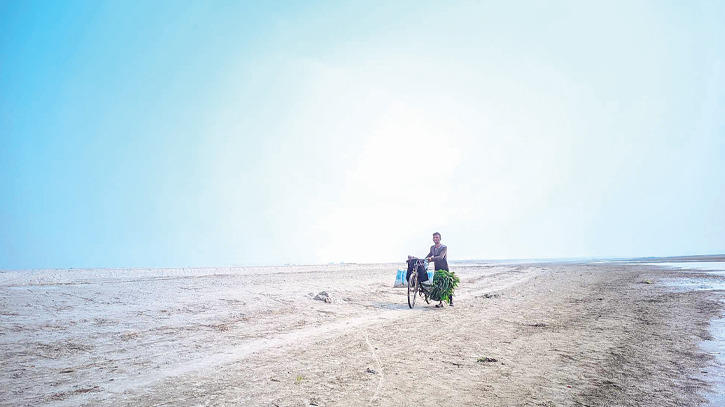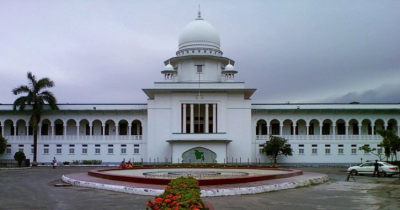
The parched riverbeds now serve as wlakways for locals, with sand dominating the landscape where water once flowed abundanty : Photo Messenger
The onset of the dry season has cast a shadow over the rivers of the Gaibandha district, triggering a significant shortage of water crucial for irrigation. Among the prominent rivers coursing through the region are the Brahmaputra, Teesta, Ghaghat, Kartoa, Bengali, alongside several smaller tributaries, amounting to a collective stretch of approximately 107 kilometers. However, the current scene paints a stark contrast as most of these rivers appear desolate, their once-flowing waters reduced to mere trickles.
The parched riverbeds now serve as walkways for locals, with sand dominating the landscape where water once flowed abundantly. Last year's scanty rainfall has exacerbated the situation, leading to a premature decline in the water levels of these rivers even before the dry season fully sets in. Consequently, agriculture and biodiversity are bearing the brunt of this ecological imbalance, with a noticeable decline in fish imports leading to fishermen seeking alternative livelihoods.
Farmers, too, face mounting challenges as they grapple with additional expenses incurred to sustain crop cultivation amidst dwindling water resources. The annual cycle of river water availability reveals a concerning pattern, with a mere four months witnessing adequate water levels while the remaining eight months experience varying degrees of scarcity, culminating in several rivers drying up entirely during the dry season.
Adding to the predicament is the significant influx of silt from upstream India, accounting for a staggering 80% of the sediment deposited in Bangladesh. Gaibandha, being a major recipient of this silt, is witnessing rapid riverbed filling, pushing its waterways perilously close to extinction. Boatmen like Malek and Hasmat Ali lament the dwindling water levels, which not only impede navigation but also incur greater fuel and time expenses, thereby denting their financial stability.
Residents such as Akbar Ali and Majid Mia mourn the vanishing fish population, forcing fishermen to seek alternative sources of income while grappling with the persistent threat of erosion exacerbated by the neglect of river maintenance. Meanwhile, farmers like Masud Molla find themselves at the mercy of irrigation demands as water levels plummet, leading to diminished fodder yields amidst rising temperatures, resulting in financial losses despite cultivation efforts fueled by loans.
Assistant Professor Tuhin Wadud from Begum Rokeya University underscores the gravity of the situation, attributing the dwindling water flow to unilateral water withdrawals upstream by India. He emphasizes the urgent need for scientific interventions to bolster the rivers' water retention capacities, citing the adverse impacts on transportation, freshwater access, and biodiversity, all exacerbated by climate change-induced stresses.
The plight of Gaibandha's rivers underscores the urgent need for concerted efforts to reverse the tide of desertification looming over this once-flourishing region. Immediate measures to enhance water retention and mitigate ecological stressors are imperative to safeguard the livelihoods and ecosystems dependent on these vital waterways.
Moreover, the advocacy for swift scientific interventions by river researchers like Tuhin Wadud highlights the pressing need for proactive measures to avert a looming environmental catastrophe. With each passing day, the urgency to bolster Gaibandha's water resources grows, underscoring the imperative for collaborative action at local, national, and international levels.
Messenger/Faria








